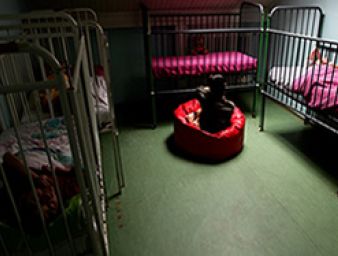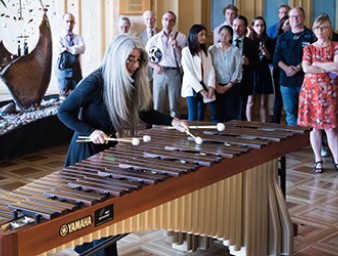In Tunisia, sign language leads to love and inclusion
21 June 2023

Mohamed Ben Smida knows well the many hardships of growing up deaf and poor in a suburb of Tunisia’s capital.
The stubborn silence in the classroom. Not being able to communicate with the bus driver. A visit to the doctor meant a family member had to be always present, even when he wanted to discuss something personal. Frustrated at his growing isolation, he left school and retreated into his own world.
“When you are a young deaf person in a non-inclusive society, where nothing is thought out for the balance and well-being of disabled people, everything is complicated,” said Ben Smida, 22.
“I had trouble fitting in and succeeding in my studies. At 15, I decided to leave high school because I was old compared to my classmates and I could no longer progress,” he said, speaking through a sign language translator.
Like Ben Smida, persons with disabilities living in Tunisia, face discrimination and barriers every day that restrict them from participating in society on an equal basis with others.
“No place for girls like me”
A disproportionate number of people with disabilities live in developing countries, where they remain largely invisible and marginalized. Women and girls with disabilities in particular are frequently pushed to the extreme margins, a factor that increases their vulnerability and trauma.
“From the beginning of my adolescence, I was left to my own devices,” said Salma Saied, 19.
Saied opened-up about the emotional wounds she suffered as she tried to navigate through life as a young deaf girl, including relationship problems with boys her age.
“I was not a happy teenager. I was looking for myself in a society where there was no place for girls like me,” she added.
The Convention on the Rights of Persons with Disabilities calls for the inclusion and participation of persons with disabilities across the human rights, development and humanitarian agendas.
According to the World Health Organisation, 1 billion people – 16% of the world’s population – are disabled. The definition of disability under the convention encompasses a wide range of impairments – physical, sensory, intellectual and mental health – but with a common experience of stigma and exclusion.
In Tunisia, UN Human Rights is working with the Tunisian government and civil society to eliminate barriers and promote the full inclusion of persons with disabilities, including through the recognition of sign language and Braille for deaf people. The Office is supporting the Government in its efforts to harmonise national laws and policies in line with the Convention and the broader human rights framework.
“The barriers that people with disabilities face aren’t only physical ones,” said Elodie Cantier-Aristide, head of the UN Human Rights Office in Tunisia. “Communication can also be an enormous barrier for people who want to go to school, have a job, live independently, open a bank account, or have access to justice.”
“
For the past twelve years, OHCHR has made it a priority to support the inclusivity and representativity of all people in Tunisia.
“
Elodie Cantier-Aristide, Representative of the UN Human Rights Office in Tunisia
Last year, the Office provided private and public academic institutions with Braille versions of a report by Tunisia’s Truth and Dignity Commission, a body set up to seek justice for families of people who suffered torture and other rights abuses during decades of authoritarian rule in the country.
More recently, the Office organized a screening in a Tunis theatre of the review of Tunisia’s human rights records. The screening of Tunisia’s Universal Periodic Review was attended by some 100 participants from civil society, included sign language interpreters so that people with disabilities could have full access to information.
Under the auspices of the Human Rights Council, the Universal Periodic Review examines the human rights records of all 193 UN Member States, providing an open and participatory space for discussion so that States fulfil their human rights obligations.
“I really appreciated the initiative,” said Iadh Ben Mrabet, 19, who is deaf. “I did not know that Tunisia is accountable for the rights of its citizens.”
Ben Smida, Saied and Ben Mrabet said the screening was an opportunity for people with disabilities to better understand their rights and the obligations of States.
The three, all school dropouts because of their disabilities, attend a vocational school for the deaf. Saied wants to become a hairdresser, while Ben Smida and Ben Mrabet want to work in the jewellery sector.
“This is the first time that I have participated in an event of such magnitude and that I have seen other States discuss Tunisia's respect for the rights of its citizens publicly,” Ben Smida said.
“It opened my eyes, and I learned a lot from this unique experience.”



